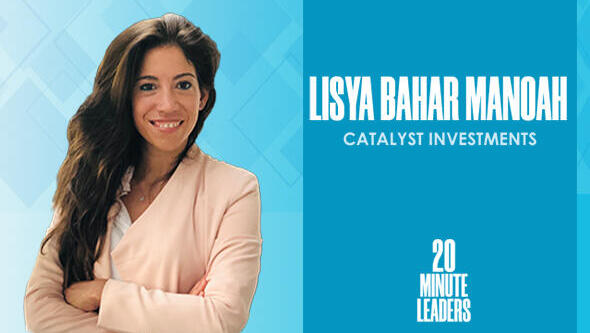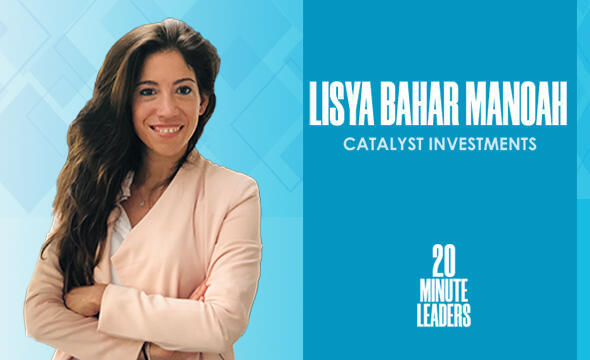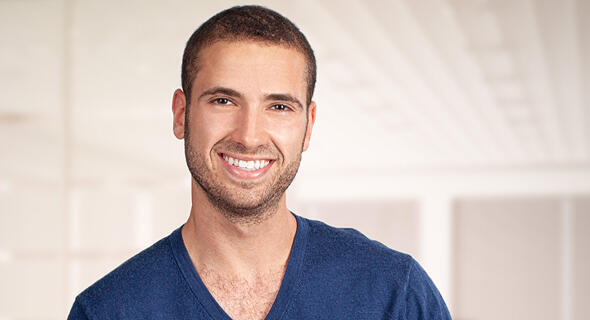
20-Minute Leaders
“To be different gives you different skills from every perspective.”
Appreciating differences was normal for Lisya Bahar Manoah, partner at Catalyst Investments, who grew up in a Jewish family in Turkey while attending German schools.
Appreciating differences was normal for Lisya Bahar Manoah, who grew up in a Jewish family in Turkey while attending German schools. She shares that those differences were seen as positive because they gave you other skills and perspectives. She is thankful for a childhood surrounded by various cultures and religions and spent in different countries. Manoah started off her career in Austria as a mechanical engineer before moving to Israel and into the financial world. Now she is a partner at Catalyst Investments, where she uses her varied background to add value for companies and investors. Though she brings a lot of knowledge in different fields, she enjoys continuing to learn every day. Manoah explains that her goal is to support entrepreneurs and help them be successful. She has learned that it’s important to give back in life, and growing the Israeli ecosystem is one way she is doing that.
Click Here For More 20MinuteLeaders
Today, you're an integral part of the Israeli ecosystem with Catalyst. But first share with me about your upbringing and the way you eventually got into tech.
For me, at least, it all comes back to where we begin from. I had an atypical childhood. I was born on a small island in Istanbul, in Turkey. I grew up with four generations in a Jewish family. I went to German schools. At the age of 17, I decided to go to Austria to study mechanical engineering. After one year, I was calling my family, "Take me back. I tried, but I'm failing.” My family told me, "You got the internship in BMW, don't reject it. But even if you are rejecting it, go there and tell them face-to-face."
I went to Graz and went into the factory. I entered the door. It was a wrong door, which I was not aware of. I said, "I am thankful, but I cannot do that internship. I'm going back to my country." He told me, "First, I believe that you are in the wrong room. And second, I never took an intern in my life, but you will stay and you will be my intern." It was game changing in my life. I stayed nine years there working as a mechanical engineer. And 11 years ago, I moved to Israel.
What was it that really made your boss want you to stay and convince you to stay?
I asked this question. Literally, he was taking me everywhere. To each meeting, to all the suppliers, to the negotiations, and to everything. When I asked that later on, "What was the interest that you took me as the intern?" He said he really appreciated that I moved all the way, three hours, and I didn't just email. "No, you came and you told me that face to face. This is the best behavioral attitude that you can do.” That was the reason he took me.
Why did you spend those three hours going there and telling them in person when you could have called?
I grew up with four generations. Literally, I saw the mother of my grandmother, so we were all together in the family. Many values that you are learning are to respect each other, elder generations and younger generations, to show empathy, to look from their point of view. It's like it was injected in my blood because I grew up with all of them together. Today, I'm grateful that they taught me these important values like respect and empathy for each other. That was the reason I went all the way.
You went to a school where you had a nuns in a primarily Muslim culture. What was sort of the reasoning behind that? Because you did grow up in a Jewish household, right?
Yes, I'm Jewish. I grew up in a Jewish household, in a Zionist household, actually. I was very active in the Jewish organizations. In Turkey today, over 90% is the Muslim culture. My family wanted me to take one of the best educations. At that time, the German schools were giving that very good education. The diversity and the different religions were a part of me from a very young childhood. I knew what is Christmas and how to celebrate Easter or to celebrate the Jewish holidays and to be respectful to all Muslim holidays and to have Muslim friends. You are not judging anyone because you are respecting everyone as it is.
It's one thing for children to learn that you're to respect diversity and to appreciate the differences. But it's another thing to live it.
To live it and to take it normal. It's not like that's so special. Nobody is judging you for being that different from the others. On the contrary, to be different gives you different skills from every perspective. I decided in my family to study mechanical engineering, and today many people ask me, "Someone judged you \[as a woman\]?" "It was very normal. Nobody asked me that." In that perspective, I'm really grateful that I was given the possibility from childhood in a diverse culture and religions and different countries.
How do you see your role in the Israeli ecosystem today?
I'm a partner at Catalyst funds. It was not my plan to join a VC or private equity. I was an engineer and jumped into the financial life a decade ago when I moved to Israel. I was doing a lot of M&As. Then I went to post-merger integration and to private equity who bought that Keter Group, so then I was suddenly on the buy side. That was my decision point. "Okay. So I need to join the VC." I joined the private equity/venture capital that has existed for over 23 years. I joined as a fourth partner almost four years ago. I am supporting the entrepreneurs. My only goal is to support them and bring them more success. It's all about the people at the end. So you want to add added value from every perspective. That's my passion.
The other side is being in contact with the investors. To gain their trust and to understand them and to add value, to be able to co-invest with them in the companies, in the sectors where they love, it is for me unmeasurable. I enjoy the day every day doing that.
Did you have that same satisfaction or is it a different type of satisfaction between what you're doing now and what you did before?
Hundred percent it's completely different. Investment in the VC ecosystem is combining everything, so it gives me the opportunity to bring my technical knowledge to the companies where I can bring it. If I can give that added value, for me, it's great. I worked four and a half years in one of the biggest agro companies, ADAMA. Today, one of my passions is to add value to the agro tech and food tech companies.
From the financial perspective, all the M&As was the linkage between the company and the financial institutions. Our goal is to bring the company to scale up and to bring them to the exit. This is where we can help them through the M&As, through the IPO. It's definitely a great added value, the background of what I've done. I appreciate that I'm still learning every day. I think there is never an age where you can stop learning.
What did you learn about yourself through all these different experiences?
When I was young, there was a big earthquake in Istanbul, 1999. It was like the longest 45 seconds in your life. You see that a lot of damaged buildings and many people died, unfortunately. You think that in 45 seconds, all your life can change. On that day, I promised myself that I want to be in a position that as much I'm taking, I want to give it also.
From the investment perspective where I'm sitting today, I'm grateful that the investors are trusting and giving millions of dollars that we can invest in the companies. But on the other side, we are supporting the technical ecosystem. We are creating jobs; we are making the Israeli companies even bigger. If our high-tech companies can hire that additional hundred people, I am thankful for that because they have families and children. To be in the position to be able to give, that is the most important thing. I hope I will continue that, whatever I do in my life.
Michael Matias, Forbes 30 Under 30, is the author of Age is Only an Int: Lessons I Learned as a Young Entrepreneur. He studies Artificial Intelligence at Stanford University, is a Venture Partner at J-Ventures and was an engineer at Hippo Insurance. Matias previously served as an officer in the 8200 unit. 20MinuteLeaders is a tech entrepreneurship interview series featuring one-on-one interviews with fascinating founders, innovators and thought leaders sharing their journeys and experiences.
Contributing editors: Michael Matias, Megan Ryan

